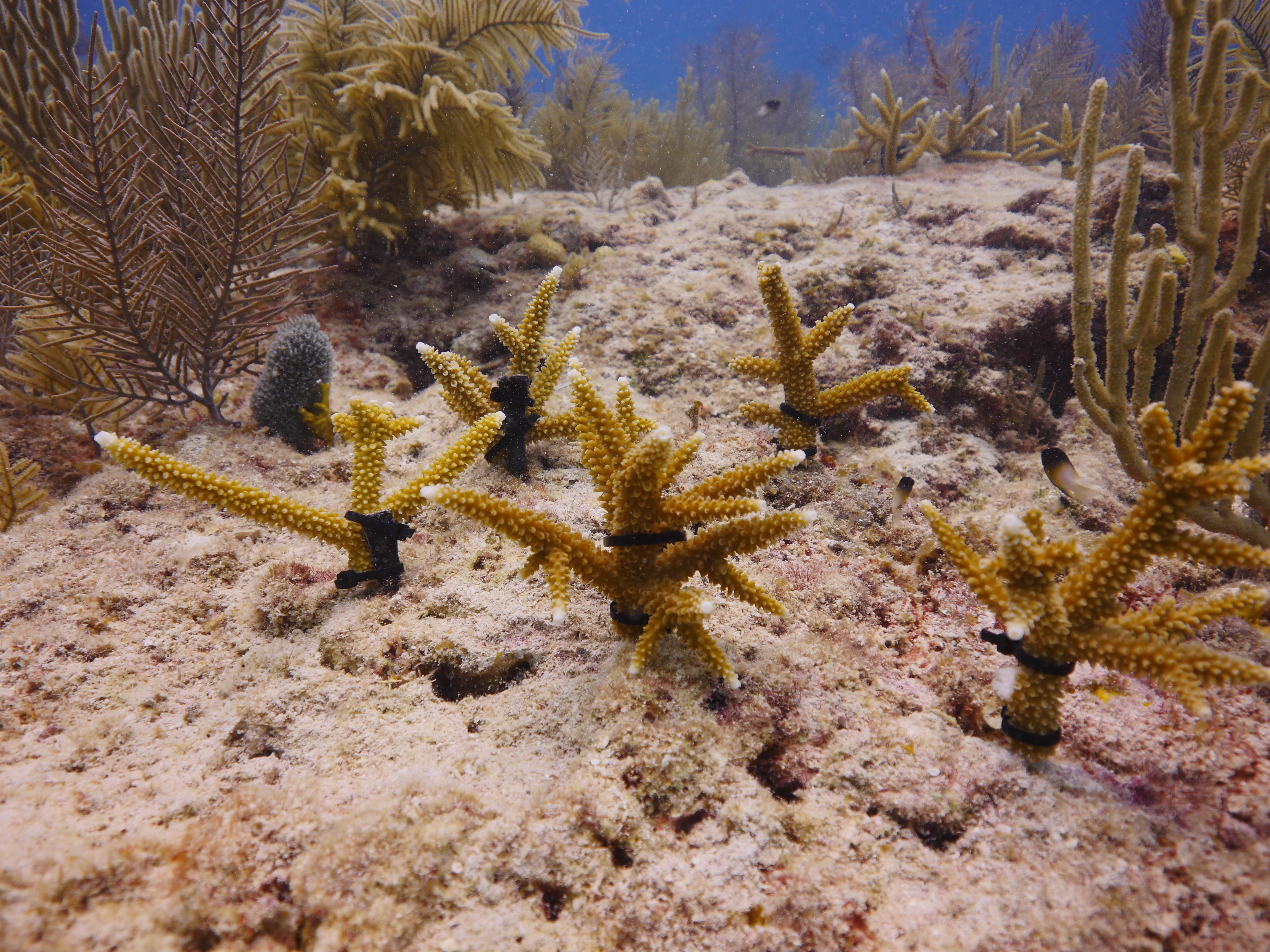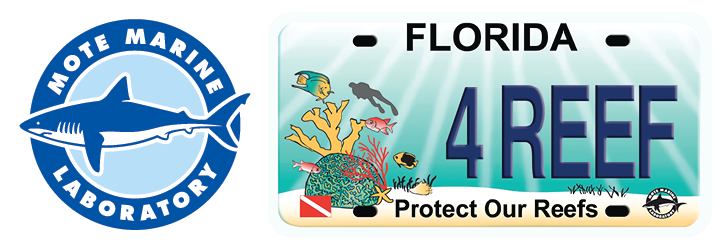Protect Our Reefs grants awarded for cutting-edge coral research
Photo below: Staghorn corals planted for restoration.Credit Joe Berg/Way Down Video.
--

Sales of the Protect Our Reefs specialty license plate, administered by Mote Marine Laboratory, fuel new and ongoing projects in coral reef restoration, science and public education focusing especially on Florida’s major reef tract, which extends from Miami to the Dry Tortugas.
Florida’s reefs — which form the only barrier reef system in the continental U.S. — underpin the state’s marine ecosystems while bringing $6.3 billion to its economy and protecting its coastlines from major storms. Sadly, in some areas of Florida and the Caribbean, coral cover has declined by 50-80 percent in just the last three decades due to natural occurrences and human impacts such as climate change, ocean acidification, pollution and more.
The 2017-18 Protect Our Reefs projects will work to tackle these challenges from multiple angles and supply new data to inform the management of coral reefs in state waters and beyond.
“Florida drivers should be proud — they’re supporting an incredible lineup of research projects this year, many of which are focused on gaining specific knowledge we need for effective coral reef restoration,” said Dr. David Vaughan, Executive Director of Mote’s International Center for Coral Reef Research & Restoration on Summerland Key, Florida. “Reefs can only be replenished and sustain themselves into the future if we understand the threats they face and we account for those challenges in our restoration strategies.”
Most of the grantees will conduct their research projects from Mote’s Summerland Key campus, where longstanding buildings were recently replaced with a new, state-of-the-art, International Center for Coral Reef Research & Restoration.
“This year’s grantees include some of the first scientists who will work from Mote’s new International Center for Coral Reef Research & Restoration — and we’re excited to see their projects get under way,” said Dr. Michael P. Crosby, President and CEO of Mote. “We hope that the latest Protect Our Reefs grants, and our new facility, will enable the brightest minds to focus even more intently on Florida’s coral reefs and lead collaborative science, restoration and education projects with local to international impact.”
Learn more about the Protect Our Reefs program and license plate at: www.motereefplate.com
Projects supported by Protect Our Reefs grants for 2017-18
(Alphabetical by last name of principal investigator)
- Project: Introduction of thermotolerant symbionts into restored corals using tissue implants as vectors: A field study. Principal investigator: Andrew Baker/University of Miami, RSMAS.
- Project: Restoring threatened staghorn and elkhorn coral in the Florida Keys. Principal investigator: Erich Bartels/Mote Marine Laboratory.
- Project: Stress-hardening of reef corals and its application to coral reef restoration; a transcriptomic and microbial perspective. Principal investigator: Ross Cunning/University of Miami, RSMAS.
- Project: Optimizing light irradiance during the grow-out of sexually-produced Montastraea cavernosa and Siderastrea siderea. Principal investigator: Joana Figueiredo/Nova Southeastern University.
- Project: Acclimatization ability and its effect on outplanting success. Principal investigator: Matthew Gilg/University of North Florida.
- Project: Measuring the impacts of Everglades restoration on post-larval swimming behaviors of the commercially important Florida stone crab. Principal investigator: Philip Gravinese/Mote Marine Laboratory.
- Project: Assessing the impact of climate change on Symbiodinium community structure using the next generation sequencing. Principal investigator: Emily Hall/Mote Marine Laboratory.
- Project: Ocean Acidification Flow-Thru Experimental Raceway Units (OAFTERU): Simulating the future of coral reefs. Principal investigator: Emily Hall/Mote Marine Laboratory.
- Project: Post outplant growth and calcification of two in situ restoration methods for Acropora cervicornis in the context of coral restoration efforts in the Florida Keys. Principal investigator: Emily Hall/Mote Marine Laboratory.
- Project: Evaluating Acropora restoration sites 5 years after outplanting and identifying site characteristics of successful outplant sites. Principal investigator: Kerry Maxwell/Florida Fish and Wildlife Conservation Commission.
- Project: The role of reef features in affecting fish grazing on coral restoration efforts. Principal investigator: Daniel McCarthy/Jacksonville University.
- Project: Coral Reef Youth Education Program. Principal investigator: Millard McCleary/Reef Relief.
- Project: How do lab-based nurseries alter the physiology and microbiome of massive corals used for restoration? Principal investigator: Erinn Muller/Mote Marine Laboratory.
- Project: Coral reskinning and fusion. Principal investigator: Christopher Page/Mote Marine Laboratory.
- Project: Improving successful techniques for the settlement and outplant of coral recruits to increase genetic diversity. Principal investigator: Christopher Page/Mote Marine Laboratory.
- Project: Investigation of the transmission, infectivity and host specificity of a coral disease outbreak on Florida reefs. Principal investigator: Valerie Paul/Smithsonian Marine Station at Fort Pierce.
- Project: Effects of sedimentation stress in adult and early life stages of corals, including two ESA-listed species. Principal investigator: Xaymara Serrano/ University of Miami, RSMAS.
- Project: Assessing the differential responses of two CCA species to ocean acidification and increased seawater temperature with implications for natural reef restoration. Principal investigator: Jennifer Sneed/Smithsonian Marine Station at Fort Pierce.
- Project: New Keys Lab Operational costs and alternatives during new building construction. Principal investigator: David Vaughan/Mote Marine Laboratory.
- Project: Florida Keys BleachWatch - community based reporting of coral bleaching observations and data integration with existing NOAA remote sensing and in-situ coral bleaching early warning products. Principal investigator: Cory Walter/Mote Marine Laboratory.
- Project: Community-Based Observations of Coastal Ecosystems and Assessment Network (C-OCEAN) - reporting and response to marine events in the Florida Keys. Principal investigator: Cory Walter/Mote Marine Laboratory.
